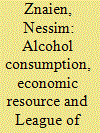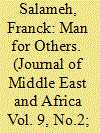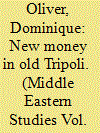|
|
|
Sort Order |
|
|
|
Items / Page
|
|
|
|
|
|
|
| Srl | Item |
| 1 |
ID:
183760


|
|
|
|
|
| Summary/Abstract |
Syria and Lebanon were declared French mandates by the League of Nations just after the First World War at the climax of a global prohibition, especially in the United States. Contrary to North Africa, Levant was already a great land of wine and arak production, especially through religious congregations. In that context, especially during the 1930s crisis, the French authorities were asked to protect and sustain the Lebanese vineyards, and more generally the alcohol levant economy. However, at the same time the administrators were pressured by Muslim lobbies and the League of Nations to ‘improve the social situation’ in the territories they had to manage, which could mean a stronger control of alcohol consumptions. In that context, alcohol regulation was a part of the paternal Republicanism that, according to Elizabeth Thompson, characterized the social policy of France in the Levant. How could the authorities manage these two different stakes? To try to answer, I have analysed the Lebanon newspapers from the nineteen-twenties in Saint-Joseph University and special issues on alcohol control, from French security services of the mandate, at the French Diplomatic Archives of Nantes (CADN).
|
|
|
|
|
|
|
|
|
|
|
|
|
|
|
|
| 2 |
ID:
161162


|
|
|
|
|
| Summary/Abstract |
The mere mention of Henri Lammens, Society of Jesus (SJ), provokes unease, notorious as this militant “priest-scholar” has become in postcolonial circles. Yet his failings notwithstanding, Lammens has been a victim of the academic conceits and biases of postmodernist postcolonialists through whose prisms he often emerges as a cantankerous, inflammatory, Christian polemicist, hell-bent on defaming an otherwise blameless, innocent, beatific Islam. This article suggests that a more nuanced gaze be cast at Henri Lammens, the man and missionary, before judging his scholarship; a corrective of sorts, shedding light on the life and times of a Belgian boy, who traveled East at the tender age of fifteen, who fell into the snare of Near Eastern Christians, and who set out to write their history and restore their suppressed memories—doing so not without the passion and affection of the neophyte.
|
|
|
|
|
|
|
|
|
|
|
|
|
|
|
|
| 3 |
ID:
190114


|
|
|
|
|
| Summary/Abstract |
This article seeks to describe the ways in which municipal administration and informal networks among political elites during the French mandate contributed to the poor state of public health in North Lebanon, in general, as well as an outbreak of typhoid in Tripoli by the late 1930s. This study largely stems from archival research in France and Lebanon. By examining state-building efforts within what came to be known as the annexed territories of Lebanon, this article will highlight the ways in which public health, as a function of colonial state formation, reproduced political and socio-spatial inequality. In turn, the effects of this inequality can be seen in the crumbling infrastructure and spread of infectious disease in North Lebanon. In these ways, the article will show how the mandate institutions and practices designed to centralize authority ultimately reproduced neo-patrimonialism and rather than create a new relation of power that bound residents to the metropole, further divided the population, widened inequality and set the precedent whereby control of public infrastructure became a political object to exploit while public infrastructure itself was left to erode overtime amid the contests for the spoils of office.
|
|
|
|
|
|
|
|
|
|
|
|
|
|
|
|
|
|
|
|
|